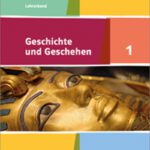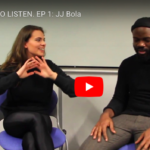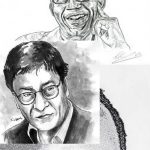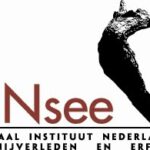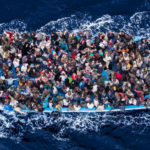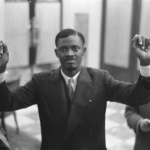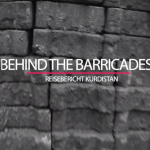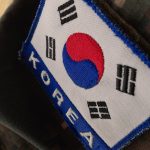by Lene Glinsky
This is a theater play in which Chinua Achebe confronts Joseph Conrad with all the racist contents in Conrad’s novel on the Congo. The research preceding the writing of this play produced 4 main characters; one is the author Joseph Conrad, who will find himself trying to explain his attitude to colonialism which led to the writing of “Heart of Darkness”. He will be supported by the choir of critics, who try to speak in his favour and defend him against the accuse of racism. On the other side we have Chinua Achebe, Nigerian author and as well the person, who started the debate of racism in Heart of Darkness with his 1975 essay “An image of Africa”. He will be supported by the leading figure of the Reader, which is very positively portrayed as a critical and reflected person who leads the discussion, asks questions and contributes impressions of reading as well as academic knowledge. The dialogues are featuring original quotes from literature essays and interviews.
Category: decoloniality
“I SEE NO CHANGES” – Exploring Mass Incarceration in the United States Through Tupac Shakur’s Lyricism
by Aaron Navid Dahm
This paper examines the issue of mass incarceration, especially its most striking feature, the racial dimension. The issue of mass incarceration is, first and foremost, a social issue and, as such, touches upon the lives of individuals, families and communities. By intertwining the music of Tupac, who was a respected voice within the Black community, with contemporary literature, I seek to break with the traditional antagonistic relationship between researcher and research topic and attempt to make the voices heard of those most affected by the here examined issue of mass incarceration. Two major themes are addressed in this paper: mass incarceration as a system of social control and the War on Drugs as the driving force behind this system. Mass incarceration can be understood as the “what” while the War on Drugs answers the question to the “how”, more specifically the question “how did we get here”? Tupac’s lyricism informs the exploration at every step of the way. Many aspects of both the system of mass incarceration as well as the War on Drugs, are addressed in his lyrics and can be explored through them. But Tupac’s voice in this paper transcends the mere function of illustration. His commentary allows the reader to gain insights into the inner life of the Black community and the effects which the system of mass incarceration has had especially on impoverished ghettos. Since the here explored system of mass incarceration has had a paramount effect on a whole population – the Black community – I think of it as my responsibility as a researcher to make these effects visible through an authentic voice from within this community. As we will see Tupac’s lyrics add an invaluable dimension to the effort of understanding this complex issue.
(Deutscher) Kolonialismus in einem Berliner Geschichtsbuch – Eine Rassismuskritische Analyse
by Miriam Bräu und Lea Leutiger (Article in German Language)
Was ist Teil der offiziellen deutschen Geschichte? Und wie wird diese vermittelt? Was wird ausgelassen und welche Perspektiven werden ignoriert? Welche Folgen kann die Geschichtsschreibung auf die Gegenwart haben?
Aus unserer Schulzeit in Deutschland erinneren wir – die zwei Autorinnen – uns daran, dass (deutscher) Kolonialismus kaum thematisiert wurde. Daher wollen wir analysieren, in welchem Umfang und auf welche Art und Weise dieser heutzutage in der Schule behandelt wird. Dafür haben wir uns ein Berliner Geschichtsbuch für die 10. Klasse herausgesucht, das wir auf bildliche Darstellung, Inhalt und Begrifflichkeiten in Bezug auf (deutschen) Kolonialismus untersuchen.
Die Analyse reiht sich in rassismuskritische Analysen europäischer Wissensproduktion ein und zeigt, wie deutsche Kolonialgeschichte im kollektiven Gedächtnis verzerrt wird und koloniale Ideen reproduziert werden.
Genocide in the Congo: It’s Time to Listen – A Video Podcast
by Nina Sophie Meyer
Have you ever asked yourself how Congo is the most resourceful country in the world, yet its people are amongst the poorest? “It’s Time To Listen”, sheds some light on the horrors of the continuing exploitation of the African continent, specifically of the DRC and its people. Not only is this topic largely neglected in the mainstream media, the prevailing discourse is having us believe that the struggles of the DRC and its people are neither directly caused by European continent nor actively affect it. This podcast is an attempt to expose some hidden truths, to explain who is concealing them and why.
Sprache und Identität für Chinua Achebe, Amin Maalouf, Ngugi Wa Thiong’O und Mahmoud Darwish
by Iman Kanaan (Article in German Language)
Die geschichtlichen und jetzigen Erfahrungen und Wahrnehmungen des Kolonialismus erfordern die dringende Thematisierung und Problematisierung von Sprachen. Dieses Thema ist zu einem Erkennungsmerkmal vieler postkolonialer Werke des 20. Und 21. Jahrhunderts geworden. Ich werde mich in meiner Referatsausarbeitung auf das Problem, in welcher Sprache Schriftsteller_innen schreiben, sowie auf Sprache als Gesamtheit sozialer und kultureller Identität beziehen. Im ersten Teil meines Beitrages werde ich die Meinungen und Argumente von Chinua Achebe und Amin Maalouf präsentieren, die der Meinung vertreten, dass Autoren_innen aus postkolonialen Staaten in den Sprachen ihrer ehemaligen Kolonialherren schreiben können. Dabei wird sich bereits die Gegenposition von Ngugi wa Thiong’O und Mahmoud Darwish stellen, die ich im zweiten Teil vorstellen werde.
The Lion and the Hunter – The NiNsee Institute and the Dutch Cultural Archive
by S.P. van der Horst
The National Institute of the Dutch History of Slavery and its Legacy Foundation (NiNsee) was one of the main actors working to strengthen the country’s discourse on racism and slavery. The cutting down of funds for this institute in 2012 almost forced this institute to close…Once again, the ‘dark pages’ of Dutch slavery history, of repression, subjugation and domination seemed to become marginalized.
Europes’ 2015 Refugee/Migration Crisis – Can the Subaltern Speak?
by Kaan Sahin
2015 saw a monumental geopolitical event take place on the shores of Europe, namely, the ‘European Migration/Refugee Crisis.’ The term is given to a period beginning in 2015 when rising numbers of people arrived in the European Union (EU), travelling across the Mediterranean Sea or overland through Southeast Europe. There has been much academic debate surrounding this perceived crisis, one being the name of it, is it a refugee, or a migration crisis? This is the first thing this paper will look into. Moving on from this, there will be then an insight into how Europe reacted to this event, with a special focus on the print media of the United Kingdom (UK), and how it perceived those involved in the crisis, and whether it was a fair portrayal. In contrast to this, the final part of this paper before concluding, will look into a documentary series by the British Broadcasting Corporation (BBC), which showed first-hand the journey of some individuals fleeing their homes to come to Europe. Looking into both forms of media will allow us to build on the ideas of the Indian scholar Gayatri Chakravorty Spivak, to see whether or not the subaltern can speak, and if any criticisms may also arise.
Leben und Tod des Patrice Lumumba – Wahrnehmung und Rezeption seines antikolonialen Kampfes
by Venceslas Jean-Marie Ayikpe und Oliver Marquart
(Article in German Language)
Diese Arbeit kritisiert, dass in den ‘westlich’ dominierten Wissenschaften die Person Patrice Lumumba, seine Rolle für die Dekolonialisierung der heutigen Demokratischen Republik Kongo und seine Ermordung wenig Beachtung findet. Die zwei Autoren beschreiben den antikolonialen Widerstand gegen die belgische Kolonialmacht mit einem Fokus auf Patrice Lumumba. Daraufhin analysieren den antikolonialen Kampf Lumumbas anhand der Perspektiven von Jean-Baptiste Ndeke, Aimé Césaire und Frantz Fanon.
Berxwedan Jîyane – ein Reisebericht aus Kurdistan
by Willi Effenberger
(Article in German Language)
Willi reiste im Frühjahr 2016, gemeinsam mit anderen Journalist_innen, nach Nordkurdistan/Bakur auf türkischem Territorium und im Mai 2016 über Bakur nach Südkurdistan/Bakûr auf irakischem Territorium. Daraus ist eine Film-Dokumentation enstanden. Außerdem liefert Willi in diesem Reisebreicht einen kleinen Einblick in die bereisten Gebiete, die aktuellen Konflikte und Beobachtungen zum Gesellschaftsentwurf des ‘Demokratischen Konföderalismus’.
What does it mean to be Korean in the Korean Situation?
by Byunkun Kim | One talks about the Korean situation, a complex clusterf*ck of North Korean military threats, the “international response” to the said threats, military exercises, flying missiles, etc. But one rarely talks about the human side of the conflict, whether it be the complete erasure of North Koreans in the discussion, or the helplessness of the South Koreans. This cannot continue. This monologue/essay is an attempt to assert that there is indeed a different dimension to the conflict, one that must be brought to light.


